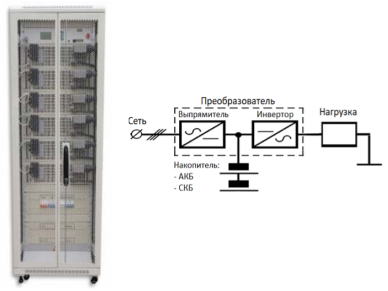Uninterruptible power supplies (UPS) with storage devices based on lithium-ion batteries and supercapacitors

Description:
RiMtechenergo company offers solutions to ensure uninterrupted power supply to industrial consumers. Depending on the conditions and type of problems encountered, solutions can be offered with different connection schemes (double on-line conversion or off-line connection) and storage options (supercapacitor storage for frequent short disturbances and lithium-ion battery to compensate for long voltage drawdowns)
Get a consultationDetailed description
The purpose of an uninterruptible power supply (UPS) is to provide uninterrupted power and protect electrical equipment from damage if there is a problem with the operating voltage source. The UPS of general industrial design is suitable for operation in AC voltage networks with a frequency of 50 Hz, with a solidly grounded neutral and a separate protective conductor (TN-S).
1. The UPS, made according to the off-line scheme, provides:
- uninterrupted power supply to the load during the transition from the network mode (power supply of the load by the mains energy) to the offline mode (supply of the load by the energy of the battery) within a time of no more than 20 ms;
- reverse transition to power supply from the network (when it is restored) with synchronization to the network in phase and frequency, without current interruption,
- recharging the battery while in standby mode. When using a lithium-ion battery, recharging is carried out according to the principle of microcycling, excluding overcharging of batteries.
2. The UPS, made according to the on-line scheme, is designed to supply the equipment connected to it with high-quality sinusoidal electricity, without interruptions in power supply when switching from mains to offline mode (supplying the load with battery energy) and vice versa; protection against distortion or loss of mains voltage, as well as suppression of high-voltage impulses and high-frequency interference coming from the network.
Batteries of supercapacitors or lithium-ion batteries can be used as storage devices.
1. UPS with supercapacitors can be used for protection against short-term interruptions (emergency shutdown of the reserve), AR (automatic reclosing). Also, the devices are indispensable as buffer devices for peak loads. They are used for computed tomography and other equipment, the operation of which is associated with the constant repetition of short-term cycles of maximum energy consumption.
Supercapacitors are a reliable solution for short-term protection of power-consuming devices in data centers, manufacturing, medical and infrastructure facilities from the most common power quality problems or power outages. In addition, they are an excellent solution for applications where traditional battery backup power supplies are not possible.
Advantages:
- Low cost per farad;
- High cycle efficiency, which reaches 95% and above;
- Long service life (up to 10 years), reliability;
- Environmental Safety;
- High power density;
- Wide operating temperature range (from -40°С to +65°С);
- A large number of cycles with practically unchanged parameters (1 million charge/discharge cycles);
- High speed of charge and discharge;
- Admissibility of discharge to zero;
- Light weight compared to electrolytic capacitors;
2. Li-ion UPS can be used to power almost any kind of load. Three-phase UPS with external battery cabinets are suitable for powering medium-sized data centers, industrial enterprises, IT complexes designed for edge computing. Such UPSs are used not only in commercial data centers, but also in corporate data processing centers of financial companies, in IT complexes of industrial enterprises, as well as in server rooms.
Advantages:
- Small size and weight, high energy and power density;
- No need for special engineering infrastructure: they can be located in ordinary premises and occupy a small area;
- Resistant to high temperatures;
- Do not contain toxic substances;
- Large discharge and charge currents;
- High efficiency in the charge-discharge cycle;
- Large reserve for charge-discharge cycles and, as a result, a long service life.
Get a consultation
Write to us and our manager will contact you soon
and give you a detailed consultation
